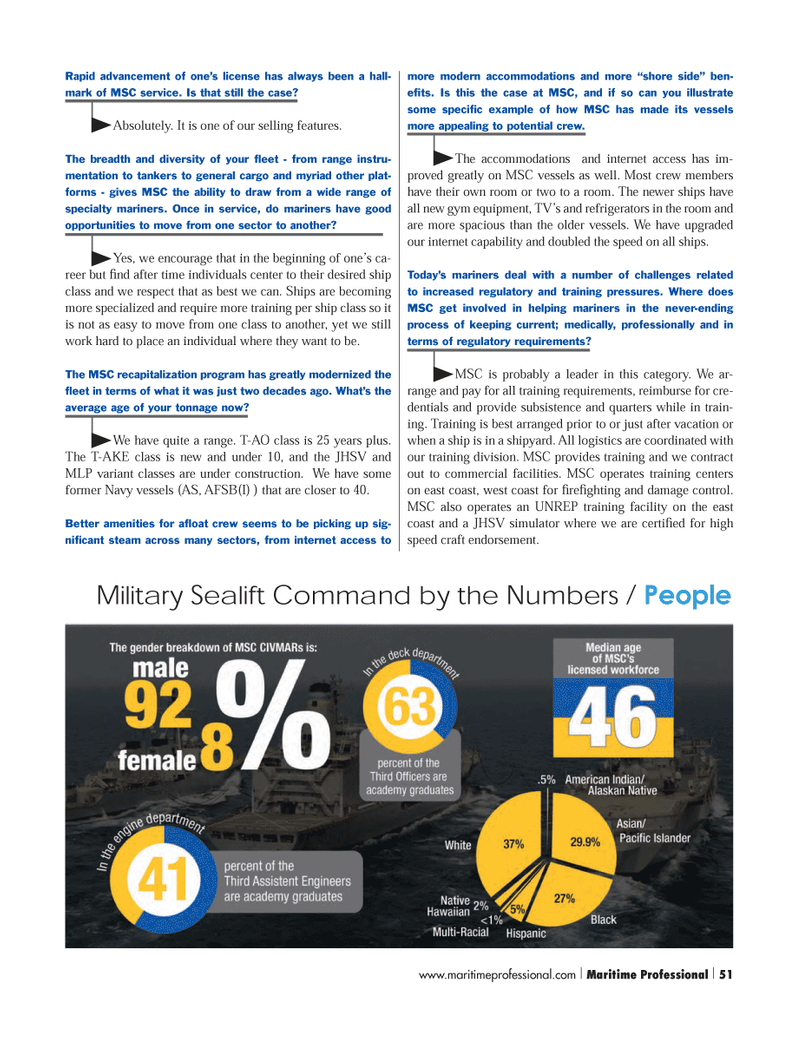
Page 51: of Maritime Logistics Professional Magazine (Q3 2014)
Power & Fuel Management
Read this page in Pdf, Flash or Html5 edition of Q3 2014 Maritime Logistics Professional Magazine
Rapid advancement of one?s license has always been a hall- mark of MSC service. Is that still the case? Absolutely. It is one of our selling features. The breadth and diversity of your eet - from range instru- mentation to tankers to general cargo and myriad other plat- forms - gives MSC the ability to draw from a wide range of specialty mariners. Once in service, do mariners have good opportunities to move from one sector to another? Yes, we encourage that in the beginning of one?s ca- reer but nd after time individuals center to their desired ship class and we respect that as best we can. Ships are becoming more specialized and require more training per ship class so it is not as easy to move from one class to another, yet we still work hard to place an individual where they want to be. The MSC recapitalization program has greatly modernized the eet in terms of what it was just two decades ago. What?s the average age of your tonnage now? We have quite a range. T-AO class is 25 years plus. The T-AKE class is new and under 10, and the JHSV and MLP variant classes are under construction. We have some former Navy vessels (AS, AFSB(I) ) that are closer to 40. Better amenities for a oat crew seems to be picking up sig- ni cant steam across many sectors, from internet access to more modern accommodations and more ?shore side? ben- e ts. Is this the case at MSC, and if so can you illustrate some speci c example of how MSC has made its vessels more appealing to potential crew. The accommodations and internet access has im- proved greatly on MSC vessels as well. Most crew members have their own room or two to a room. The newer ships have all new gym equipment, TV?s and refrigerators in the room and are more spacious than the older vessels. We have upgraded our internet capability and doubled the speed on all ships.Today?s mariners deal with a number of challenges related to increased regulatory and training pressures. Where does MSC get involved in helping mariners in the never-ending process of keeping current; medically, professionally and in terms of regulatory requirements? MSC is probably a leader in this category. We ar- range and pay for all training requirements, reimburse for cre- dentials and provide subsistence and quarters while in train- ing. Training is best arranged prior to or just after vacation or when a ship is in a shipyard. All logistics are coordinated with our training division. MSC provides training and we contract out to commercial facilities. MSC operates training centers on east coast, west coast for re ghting and damage control. MSC also operates an UNREP training facility on the east coast and a JHSV simulator where we are certi ed for high speed craft endorsement.Military Sealift Command by the Numbers / Peoplewww.maritimeprofessional.com | Maritime Professional | 5150-63 Q3 MP2014.indd 5150-63 Q3 MP2014.indd 518/14/2014 9:57:48 AM8/14/2014 9:57:48 AM

 50
50

 52
52
